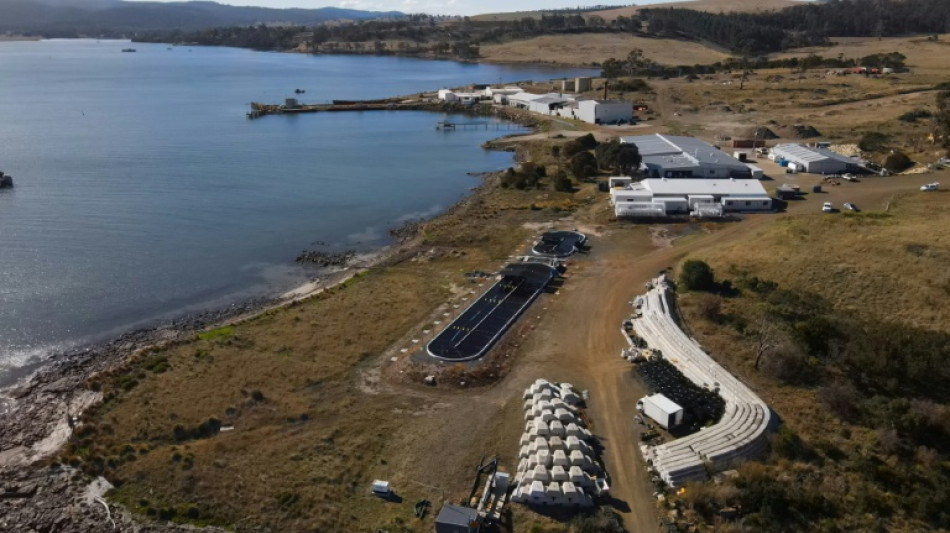
-
 Breast cancer screening scandal outrages Spain
Breast cancer screening scandal outrages Spain
-
Man Utd win on women's Champions League debut, Chelsea held by Twente

-
 Country music star clashes with Trump govt over immigration raids
Country music star clashes with Trump govt over immigration raids
-
Flintoff did not feel 'valued' by new Superchargers owners

-
 Zidane's son Luca 'proud' to play for Algeria
Zidane's son Luca 'proud' to play for Algeria
-
'Daily struggle for survival' for Haiti children, UN report says
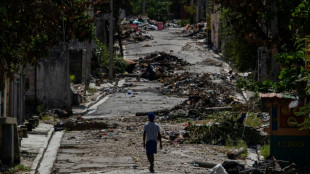
-
 Kane out but Tuchel wants more of the same from England
Kane out but Tuchel wants more of the same from England
-
US facing worsening flight delays as shutdown snarls airports

-
 Outgoing French PM sees new premier named in next 48 hours
Outgoing French PM sees new premier named in next 48 hours
-
Ratcliffe gives Amorim three years to prove himself at Man Utd

-
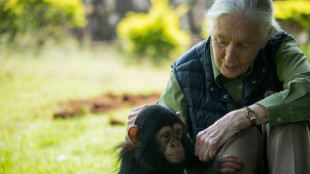 Jane Goodall's final wish: blast Trump, Musk and Putin to space
Jane Goodall's final wish: blast Trump, Musk and Putin to space
-
Salah scores twice as Egypt qualify for 2026 World Cup

-
 New 'Knives Out' spotlights Trump-era US political landscape
New 'Knives Out' spotlights Trump-era US political landscape
-
Failed assassin of Argentina's Kirchner given 10-year prison term

-
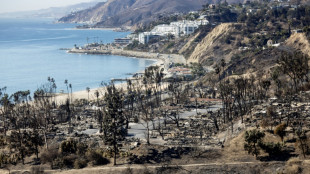 Man arrested over deadly January fire in Los Angeles
Man arrested over deadly January fire in Los Angeles
-
La Liga confirm 'historic' Barcelona match in Miami

-
 France's Le Pen vows to block any government
France's Le Pen vows to block any government
-
Mooney ton rescues Australia in stunning World Cup win over Pakistan

-
 Afghan mobile access to Facebook, Instagram intentionally restricted: watchdog
Afghan mobile access to Facebook, Instagram intentionally restricted: watchdog
-
Medvedev to face De Minaur in Shanghai quarter-finals

-
 Conceicao named as new coach of Al Ittihad
Conceicao named as new coach of Al Ittihad
-
Victoria Beckham reveals struggle to reinvent herself in Netflix series

-
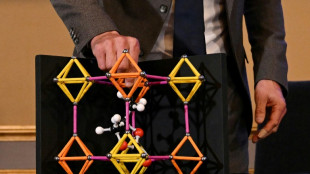 'Solids full of holes': Nobel-winning materials explained
'Solids full of holes': Nobel-winning materials explained
-
Iran releases Franco-German accused of spying

-
 Gisele Pelicot urges accused rapist to 'take responsibility'
Gisele Pelicot urges accused rapist to 'take responsibility'
-
BBVA, Sabadell clash heats up ahead of takeover deadline

-
 World economy not doing as badly as feared, IMF chief says
World economy not doing as badly as feared, IMF chief says
-
Veggie 'burgers' face the chop as EU lawmakers back labeling ban
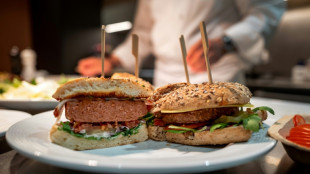
-
 Former FBI chief James Comey pleads not guilty in case pushed by Trump
Former FBI chief James Comey pleads not guilty in case pushed by Trump
-
Germany raises growth forecasts, but warns reforms needed

-
 Serie A chief blasts Rabiot's criticism of Milan match in Australia
Serie A chief blasts Rabiot's criticism of Milan match in Australia
-
From refugee to Nobel: Yaghi hails science's 'equalising force'
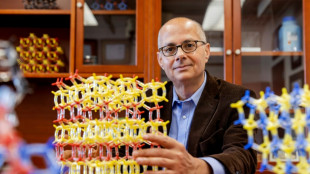
-
 De Minaur, Auger-Aliassime through to Shanghai quarter-finals
De Minaur, Auger-Aliassime through to Shanghai quarter-finals
-
Canal Istanbul stirs fear and uncertainty in nearby villages
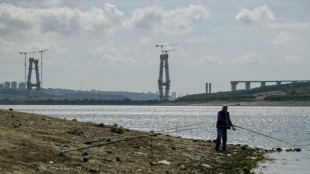
-
 Root backs England to end Ashes drought in Australia
Root backs England to end Ashes drought in Australia
-
British PM Starmer hails India opportunities after trade deal

-
 England captain Kane could miss Wales friendly
England captain Kane could miss Wales friendly
-
Tennis increases support for players under corruption, doping investigation

-
 Russia says momentum from Putin-Trump meeting 'gone'
Russia says momentum from Putin-Trump meeting 'gone'
-
EU wants key sectors to use made-in-Europe AI

-
 De Minaur, Rinderknech through to Shanghai quarter-finals
De Minaur, Rinderknech through to Shanghai quarter-finals
-
Gisele Pelicot says 'never' gave consent to accused rapist

-
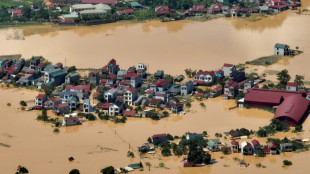 Thousands stranded as record floods submerge Vietnam streets
Thousands stranded as record floods submerge Vietnam streets
-
Sabalenka battles to keep Wuhan record alive, Pegula survives marathon

-
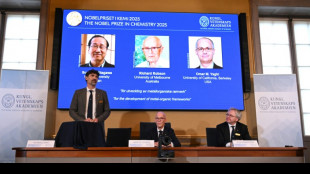 Trio wins chemistry Nobel for new form of molecular architecture
Trio wins chemistry Nobel for new form of molecular architecture
-
Tarnished image and cheating claims in Malaysia football scandal

-
 Family affair as Rinderknech joins Vacherot in Shanghai quarters
Family affair as Rinderknech joins Vacherot in Shanghai quarters
-
New documentary shows life in Gaza for AFP journalists
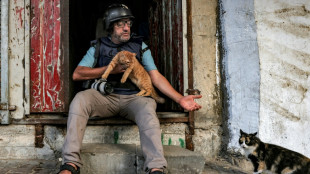
-
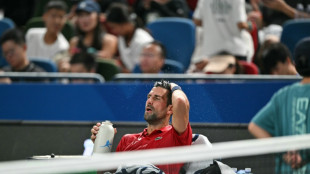 Tennis stars suffer, wilt and quit in 'brutal' China heat
Tennis stars suffer, wilt and quit in 'brutal' China heat
-
Wildlife flee as floods swamp Indian parks
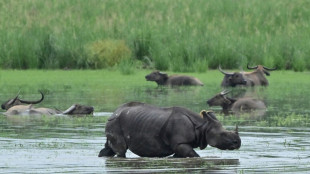

Australian seaweed farm tackles burps to help climate
It is barely visible, and needs no irrigation or fertilisers: lying off the coast of Australia is a vast seaweed crop destined to curb livestock's climate-altering flatulence and belches.
The underwater farm stretches across 1,800 hectares (4,400 acres) in the Tasman Sea, about 10 minutes off the portside town of Triabunna in the island state of Tasmania.
Beneath the waves are forests of asparagopsis, a native red seaweed abundant in Tasmanian coastal waters which is rich in the organic compound bromoform.
More than 40 studies have shown that the seaweed can lower methane emissions from livestock when added to fodder or grain, said Fran Cowley, researcher at Australia's University of New England.
According to the UN's Food and Agriculture Organization, emissions from ruminants and manure management practices account for more than 32 percent of the world's methane emissions related to human activity.
"When we look at gold-standard measurement of methane inhibition, asparagopsis is able to achieve almost complete suppression of methane suppression -- so, 95 percent," said Cowley, professor of livestock production and a leading researcher into ruminants.
While far less abundant in the atmosphere than carbon dioxide, methane is about 80 times more potent over a 20-year timescale at warming the planet.
But its lifespan is shorter, making it an important lever in attempts to limit global warming.
- Juicy meat -
Cowley led one of the longest experiments into asparagopsis, held over 200 days in bovine feed lots in the eastern state of Queensland.
Results published in August 2024 showed emissions from the animals were halved over that period when compared to animals that received no supplements.
The outcome indicated an improvement from a previous study, one of the most advanced in the field at the time, in which emissions from a Japanese herd were reduced by 28 percent.
The bromoform within the seaweed affects the digestive system and curbs the animals' burps and farts without impacting their health or the quality of the resulting food products, Cowley said.
Bromoform is a concern because at high levels it has been considered to be carcinogenic in rats, and potentially humans, she said.
But researchers found it was degraded in the stomachs of grazing animals.
"So there is no accumulation of bromoform in the meat or in the milk because it's only coming in at a relatively low dose to start with," Cowley told AFP.
"All the studies that have been done on meat have shown absolutely no accumulation of bromoform, or any impact on the taste, or the tenderness, or the juiciness of meat."
Studies had shown that any damage to the animals' rumen -- a chamber in the stomach that breaks down plants -- was no worse than in those fed a grain-based feedlot diet, she said.
- 'Enabling force' -
In Triabunna, Sea Forest's marine farm produces feed supplements from the seaweed: oils, pellets and "lick blocks" -- a solid form that animals can lick to consume.
Sea Forest founder and chief executive Sam Elsom turned to seaweed farming in 2019, after about 15 years in the textile industry.
The company wants to be the "enabling force" to make agricultural products sustainable without extra costs to farmers and consumers, he told AFP.
The seaweed is grown partly in the open sea and partly in filtered seawater ponds on land, which are easier to replicate elsewhere in the world and allow growers to control light, nutrients, and the availability of carbon.
Sea Forest is already working with Tasmanian dairy company Ashgrove and Australian burger chain Grill'd, and had signed an agreement last year with British supermarket chain Morrisons, Elsom said.
It also held "encouraging" talks with some French dairy producers and was in the process of registering its seaweed products with the European Food Safety Authority, he said.
One of the big challenges was cost to farmers, who need financial incentives and support to make the effort to lower livestock methane emissions worthwhile, Elsom said.
The ocean provides an "amazing natural resource" for food security, he said.
"Seventy-one percent of the Earth's surface is surrounded by the ocean, and seaweed require zero inputs: No irrigation, no fertiliser, no pesticides.
"So, it can grow up to 30 times faster than land-based plants. It's very exciting."
O.Schlaepfer--VB
